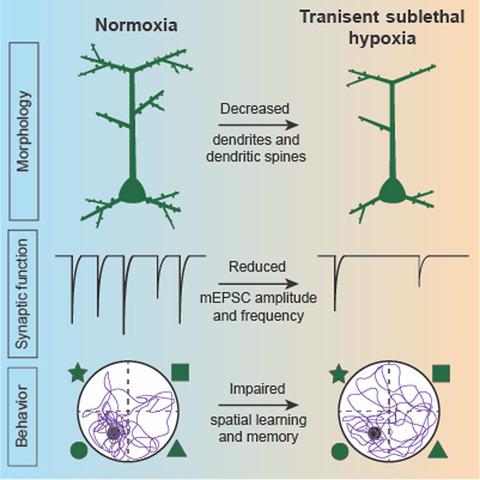当前位置:
X-MOL 学术
›
J. Neurosci. Res.
›
论文详情
Our official English website, www.x-mol.net, welcomes your
feedback! (Note: you will need to create a separate account there.)
Transient sublethal hypoxia in neonatal rats causes reduced dendritic spines, aberrant synaptic plasticity, and impairments in memory.
Journal of Neuroscience Research ( IF 2.9 ) Pub Date : 2020-06-03 , DOI: 10.1002/jnr.24652 Wenjie Tang 1 , Xiaoming Xin 2 , Margaret O'Connor 3 , Nana Zhang 1 , Bin Lai 4 , Heng-Ye Man 3 , Yuanyun Xie 5 , Youzhen Wei 1
Journal of Neuroscience Research ( IF 2.9 ) Pub Date : 2020-06-03 , DOI: 10.1002/jnr.24652 Wenjie Tang 1 , Xiaoming Xin 2 , Margaret O'Connor 3 , Nana Zhang 1 , Bin Lai 4 , Heng-Ye Man 3 , Yuanyun Xie 5 , Youzhen Wei 1
Affiliation

|
Hypoxic/ischemic insult, a leading cause of functional brain defects, has been extensively studied in both clinical and experimental animal research, including its etiology, neuropathogenesis, and pharmacological interventions. Transient sublethal hypoxia (TSH) is a common clinical occurrence in the perinatal period. However, its effect on early developing brains remains poorly understood. The present study was designed to investigate the effect of TSH on the dendrite and dendritic spine formation, neuronal and synaptic activity, and cognitive behavior of early postnatal Day 1 rat pups. While TSH showed no obvious effect on gross brain morphology, neuron cell density, or glial activation in the hippocampus, we found transient hypoxia did cause significant changes in neuronal structure and function. In brains exposed to TSH, hippocampal neurons developed shorter and thinner dendrites, with decreased dendritic spine density, and reduced strength in excitatory synaptic transmission. Moreover, TSH‐treated rats showed impaired cognitive performance in spatial learning and memory. Our findings demonstrate that TSH in newborn rats can cause significant impairments in synaptic formation and function, and long‐lasting brain functional deficits. Therefore, this study provides a useful animal model for the study of TSH on early developing brains and to explore potential pharmaceutical interventions for patients subjected to TSH insult.
中文翻译:

新生大鼠的短暂亚致死缺氧导致树突棘减少、突触可塑性异常和记忆障碍。
缺氧/缺血性损伤是功能性脑缺陷的主要原因,已在临床和实验动物研究中得到广泛研究,包括其病因、神经发病机制和药理干预。暂时性亚致死缺氧 (TSH) 是围产期常见的临床现象。然而,它对早期发育大脑的影响仍然知之甚少。本研究旨在研究 TSH 对早期出生后第 1 天幼鼠的树突和树突棘形成、神经元和突触活动以及认知行为的影响。虽然 TSH 对海马的大体脑形态、神经元细胞密度或神经胶质激活没有明显影响,但我们发现短暂的缺氧确实会导致神经元结构和功能的显着变化。在暴露于 TSH 的大脑中,海马神经元发展出更短更薄的树突,树突棘密度降低,兴奋性突触传递强度降低。此外,TSH 治疗的大鼠在空间学习和记忆方面表现出认知能力受损。我们的研究结果表明,新生大鼠的 TSH 会导致突触形成和功能的显着损害,以及长期的脑功能缺陷。因此,本研究为早期发育大脑中 TSH 的研究提供了一个有用的动物模型,并探索了对 TSH 损伤患者的潜在药物干预。我们的研究结果表明,新生大鼠中的 TSH 会导致突触形成和功能的显着损害,以及长期的脑功能缺陷。因此,本研究为早期发育大脑中 TSH 的研究提供了一个有用的动物模型,并探索了对 TSH 损伤患者的潜在药物干预。我们的研究结果表明,新生大鼠的 TSH 会导致突触形成和功能的显着损害,以及长期的脑功能缺陷。因此,本研究为早期发育大脑中 TSH 的研究提供了一个有用的动物模型,并探索了对 TSH 损伤患者的潜在药物干预。
更新日期:2020-06-25
中文翻译:

新生大鼠的短暂亚致死缺氧导致树突棘减少、突触可塑性异常和记忆障碍。
缺氧/缺血性损伤是功能性脑缺陷的主要原因,已在临床和实验动物研究中得到广泛研究,包括其病因、神经发病机制和药理干预。暂时性亚致死缺氧 (TSH) 是围产期常见的临床现象。然而,它对早期发育大脑的影响仍然知之甚少。本研究旨在研究 TSH 对早期出生后第 1 天幼鼠的树突和树突棘形成、神经元和突触活动以及认知行为的影响。虽然 TSH 对海马的大体脑形态、神经元细胞密度或神经胶质激活没有明显影响,但我们发现短暂的缺氧确实会导致神经元结构和功能的显着变化。在暴露于 TSH 的大脑中,海马神经元发展出更短更薄的树突,树突棘密度降低,兴奋性突触传递强度降低。此外,TSH 治疗的大鼠在空间学习和记忆方面表现出认知能力受损。我们的研究结果表明,新生大鼠的 TSH 会导致突触形成和功能的显着损害,以及长期的脑功能缺陷。因此,本研究为早期发育大脑中 TSH 的研究提供了一个有用的动物模型,并探索了对 TSH 损伤患者的潜在药物干预。我们的研究结果表明,新生大鼠中的 TSH 会导致突触形成和功能的显着损害,以及长期的脑功能缺陷。因此,本研究为早期发育大脑中 TSH 的研究提供了一个有用的动物模型,并探索了对 TSH 损伤患者的潜在药物干预。我们的研究结果表明,新生大鼠的 TSH 会导致突触形成和功能的显着损害,以及长期的脑功能缺陷。因此,本研究为早期发育大脑中 TSH 的研究提供了一个有用的动物模型,并探索了对 TSH 损伤患者的潜在药物干预。











































 京公网安备 11010802027423号
京公网安备 11010802027423号